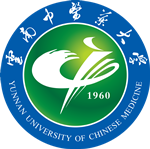School Badge

About Yunnan University of Chinese Medicine
Yunnan University of Chinese Medicine, founded in 1960, is the second batch of higher Chinese medicine undergraduate colleges in China. It was granted the right in 1986, and became a doctoral degree awarding unit in 2018. It was renamed Yunnan University of Traditional Chinese Medicine and became a national Chinese medicine clinical research base. In 2008, it became a university jointly established by Yunnan Provincial People’s Government and state administration of traditional chinese medicine. The school adhering to the principle of “respecting morality and harmony, learning and learning” has developed into a comprehensive Chinese medicine college with traditional Chinese medicine as the main body, ethnic medicine as the feature, undergraduate education as the foundation, the continuous expansion of postgraduate education and the good trend of foreign education, and the coordinated development of medicine, science, engineering and management.As of October 2022, the school has more than 15,000 full-time students. Among them, there are 12,198 undergraduates, 2,270 postgraduates, 31 postgraduates and 181 international students. There are 11 secondary colleges and 1 public course teaching department. There are 17 state administration of traditional chinese medicine, 14 provincial key disciplines, 1 doctoral degree authorization point for first-class disciplines of traditional Chinese medicine, 4 first-class disciplines (covering 28 two disciplines) and 4 professional master degree points. There are 26 undergraduate majors, including 3 national first-class specialty construction points, 2 national-level specialty, pilot major of comprehensive reform, 5 provincial-level first-class specialty construction points, 3 provincial-level pilot major of comprehensive reform, 5 provincial-level specialty, the leading brand specialty of eight key industries in the south, and more than 200 quality engineering projects above the provincial level. There are more than 140 practice teaching bases, 2 affiliated hospitals and 14 non-affiliated hospitals. There are more than 1.1 million books in paper books, and it is a pilot unit of national education informatization. There are more than 820 faculty members in the school-based department, with reasonable educational background, academic background and professional title structure. There are 18 doctoral tutors, 7 experts enjoying special state allowance, 1 national famous Chinese medicine practitioner in the first session, 1 young and middle-aged expert with outstanding contributions from the National Health and Family Planning Commission, 8 teachers from Chinese medicine universities in the country and 8 provincial famous teachers. Yunnan Province has 1 planned industrial talent, 1 high-end foreign expert and 9 young talents. There are 2 scholars in Yunnan Huayunling, 15 famous doctors, 3 leading talents in industrial technology, 4 famous Chinese doctors in Yunnan Province, 36 famous Chinese doctors and 33 doctors. There are 14 experts enjoying special allowance from Yunnan provincial government, 17 young and middle-aged academic and technical leaders in Yunnan province, 2 reserve talents and innovative talents, and 3 trainees. The first batch of 7 leading talents of Chinese medicine in Yunnan Province, high-level talents of Chinese medicine and their training objects invited more than 420 well-known professors and experts at home and abroad to serve as tutors, honorary principals, visiting professors and honorary professors for master students.
Over the past 60 years, several generations of famous doctors have given everything to each other, devoted themselves to educating people, and trained more than 60,000 Chinese medicine professionals, some of whom are rooted for the benefit of Sangzi, some of whom travel overseas, Everbright Chinese Medicine, and there have emerged the first prize of national scientific and technological progress, Zhu Zhaoyun, a medical expert who won the He Liang He Li Award, Zhu Miansheng, the founder of time-space acupuncture and the winner of the Knight Medal of the French Legion of Honor. Ning Yagong, a famous Chinese military medical teacher; Wang Jie, chief researcher of Chinese Academy and former president of Guang ‘anmen Hospital; Chen Benshan, an advanced individual of national unity and progress; A large number of outstanding alumni, such as the teacher of ideological and political theory course in the teaching department of Renmin University of China and Wang Xiangming, the influential model figure in 2014, are well-known at home and abroad.
The school focuses on three major research clusters: ethnic medicine, southern Yunnan medicine and southern medicine research. The school has three provincial key laboratories, two technical research centers, one Chinese medicine clinical evaluation research center, one engineering laboratory, two public science and technology service platforms, three provincial teams, two tertiary laboratories of Chinese medicine research in state administration of traditional chinese medicine, 18 academician expert workstations and stations, two provincial 20 new centers, one national Chinese medicine clinical research base and one provincial philosophy and social science research base. School journals are the core journals of Chinese science and technology. Promote the cooperation between school administration, school, school place and school-enterprise, and build four platforms of “third-party detection of health products and cosmetics, clinical evaluation research, healthy hair and strategic operation center of Chinese medicine intellectual property rights” to make up for the short-board supervision bureau of Yunnan biomedical and big health industry research platform to jointly build Yunnan Institute of Traditional Chinese Medicine Industry Development and jointly set up “Chinese Medicine Joint Special Fund” with the Provincial Science and Technology Department, which is a pilot unit of nationalization, a Chinese medicine policy research center of Yunnan Province and a Chinese medicine data center of Chinese Academy of Chinese Medical Sciences in Yunnan. The school has the only museum of western medicine in the world; In July, 2017, Hanban approved the establishment of “Confucius Institute Headquarters) Chinese Medicine Culture Promotion and Research Base”. There is Yunnan Provincial Museum of Traditional Chinese Medicine and Ethnic Medicine, which is the popular science education base of Yunnan Province for national Chinese medicine culture publicity and education.
As early as 1990, on behalf of China and Spain, we cooperated in running schools and established Catalonia-Yunnan College of Traditional Chinese Medicine, which was recorded in the 60-year history of medical higher education. Since 2007, it has successively sponsored and hosted several “Greater Mekong Subregion Traditional Medicine Exchange Conferences”; 20. Open “Chinese Medicine Education and Training Center” in Laos; In 2016, “Lancang-Mekong Traditional Medicine College” was established; In 2017, it was approved as “Dian Chinese Medicine Center”; In 2018, we will host the first international Hani Medicine Development Exchange Conference. It is unique in the study of western Chinese medicine. The 5th International Forum on Western Chinese Medicine has provided useful reference for “Chinese culture going global”. The school has established exchanges and cooperation relations with more than 30 countries. It is the international education base of traditional Chinese medicine in Yunnan Province and the international scientific and technological cooperation base, and has become a powerful platform for international exchanges and cooperation in traditional Chinese medicine education in South Asia and Southeast Asia. In the heyday, Chinese medicine has ushered in a good opportunity for development with the right time, right place and harmonious people. Traditional Chinese medicine has been promoted as a national strategy, and Yunwu Medicine and Great Health Industry rank first among the eight key industries to be promoted, creating three cards of “green energy”, “green food” and “healthy life”. Kunming has been approved to set up a national-level great health industry demonstration zone and build a national botanical museum. The school will take advantage of the trend, actively integrate into the “the belt and road initiative” initiative, healthy China and other national strategies, focus on Yunnan’s three strategic orientations, serve Yunnan’s economy, promote the construction of a high-level university of traditional Chinese medicine with distinctive features, and strive to build the school into a high-level university of traditional Chinese medicine with obvious advantages in the west, national color and important influence on South Asia and Southeast Asia.







